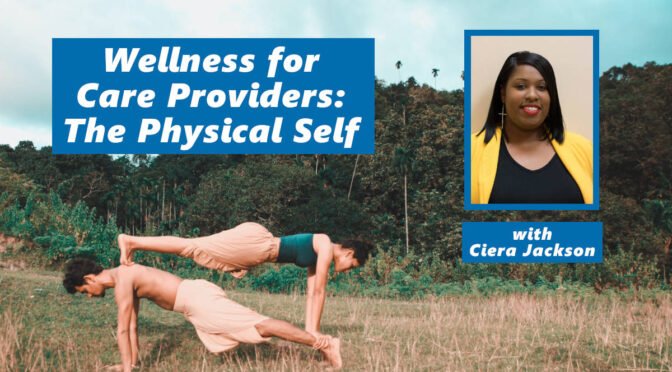Wellness for Care Providers: The Many Facets of Physical Self-Care

For those of us who work in the caring professions—such as health care, education, emergency services, criminal justice, and social work—our job is to care for the well-being of other people. However, this is difficult to do if we aren’t also managing our own health and wellness. As Cummins’ Professional Development Specialist, Ciera Jackson, likes to say, “You can’t pour from an empty cup.”
In the previous post of our series on Wellness for Care Providers, we discussed the many dimensions of the personal self and how you can practice personal self-care. However, we left out one dimension of the self that is significant enough to warrant a separate discussion: the physical self.
Physical self-care is essential for overall health and wellness. Not only do we enjoy life more when we are physically healthy, but the health of our physical body also has a direct influence on our mental and emotional health. One of the simplest and most effective ways to improve mental and emotional well-being is to focus on improving our physical well-being.
In this post, we’ll divide the physical self into its core components and share some simple advice for maintaining each one. We’ll be guided once again by Ciera Jackson, who shares her thoughts and suggestions on this topic.

(Ciera Jackson, MSW, LCSW, Professional Development Specialist at Cummins Behavioral Health)
Nutrition: Providing the Right Fuel for the Body
Physical self-care is all about keeping our bodies as healthy as we can, and a large part of keeping our bodies healthy involves being mindful of what we are putting into them.
It can be helpful to think of food and drink as fuel for the body. Giving our bodies high-quality fuel helps them run more efficiently and can make us feel better all around. By contrast, low-quality fuel creates strain on our bodily systems and can make us feel worse.
“What you put into your body will fuel you,” Ciera says. “If you’re eating McDonald’s Big Macs all the time, you’re probably going to feel like a Big Mac. Versus if you’re putting vegetables, water, and various nuts and berries into your body, you’re probably going to feel like that.”
Maintaining good nutrition is a crucial component of physical self-care. Here are a few pieces of advice to keep in mind when it comes to nutrition:
- Try to avoid processed foods. These foods typically contain fewer nutrients and more unhealthy additives like salt, sugar and fat than “whole” or unprocessed foods.
- Don’t skip meals; eat small meals. Eating smaller portions more frequently is better for your body than consuming large amounts of food all at once. Ciera acknowledges that this can be a challenge when we are short on time. “Sometimes as practitioners, especially if you’re in the office and you have patients back to back, it can be hard to get those meals. But if you keep little snacks in your desk, or if you carry a little cooler or something, then maybe you can kind of eat quickly.”
- Try new foods. Eating the same things every day can cause you to miss out on essential vitamins and nutrients. Experimenting with new foods is an easy way to increase your nutrient variety.
- Feed your body veggies. Vegetables are perhaps the best type of food you can eat, so you should make an effort to eat as many as you can. “Even if it’s just one vegetable that you like, find one and stick with it,” Ciera encourages.
- Your body needs water! Beverages like coffee, tea, fruit juice and soda pop are not good substitutes because they may contain added sugars or dehydrating ingredients. Make an effort to drink pure water every day.
Exercise: Keeping the Body Active
The benefits of regular physical activity have been well documented for many years now. Here are just a few of them:
- Exercise controls weight
- Exercise combats health conditions and diseases
- Exercise improves mood
- Exercise boosts energy
- Exercise helps with sleep
- Exercise can help with brain functioning
We all know that exercise is good for our health, so why do many of us have such a hard time doing it?
“Many of us live a fast-paced life,” Ciera says. “We want things quickly. Research has shown that if exercise could come in a pill form, many people would take the pill, hence why there are so many diet pills and ‘lose weight quick’ programs out there. People want to be healthy or lose weight, but it is very difficult for them to do it.”
Of course, a shortage of time can be a legitimate barrier to getting enough exercise, especially when we have responsibilities to family and loved ones on top of our work duties. “We have to be honest with ourselves about when is the most optimal time of day to actually get a workout in,” Ciera advises. “And maybe you have to start small. Maybe you don’t have time during the week, but you can exercise just during the weekend. Maybe you can start with one day of the week and then work your way up. Something is better than nothing.”
Finally, Ciera suggests finding and sticking to a few exercises you enjoy rather than pushing yourself to do exercises you don’t like. “You know what I like when I go to the gym? The battle ropes. Those are fun for me. So you have to find what you like. Maybe it’s strength training, maybe it’s lifting weights, maybe it’s the stationary bike. Whatever it is, find your thing and stick with it,” she says.
Sleep: The Body’s Recovery Period
Our bodies are highly sophisticated biological machines, but they can only run for so long before they need to recuperate. Sleep is our natural recovery period, during which many of our bodily systems are “recharged” for continued use.
Adults need between 7 and 9 hours of sleep each night in order to function properly. “When you’re not getting enough sleep, you can be cranky. When you don’t have enough sleep, you’re just not yourself. So, getting a good routine down is important. Just like we do for children, as adults, we should have a sleep routine,” Ciera says.
Keeping a sleep routine helps our bodies prepare to go to sleep each night, which can be beneficial if you struggle to get enough rest during the week. Some activities you can try for your before-bed routine include:
- Turn off all electronics 30–60 minutes before bed. “For some people, electronics tend to stimulate them,” Ciera says. “So if they’re looking at their phone, then they’re just wired to it. However, for some other people, it’s their way to wind down. It just kind of depends on who you are.”
- Take a bath or shower. Bathing, especially in warm or hot water, can be soothing and sleep-inducing for some people.
- Dim the lights. A reduction in light levels is one of the body’s natural cues to prepare for sleep.
- Use aromatherapy. Some popular examples include candles, oil diffusers, and lotions.
- Drink hot tea, hot chocolate, or warm milk. Just remember to avoid anything with caffeine or large amounts of sugar.
- Listen to relaxing music or an audio book.
- Meditate.
- Write in a journal.
In addition, it can also be helpful to go to bed at the same time each night and to use your bed only for sleeping and intimacy. These habits can help provide behavioral cues for the body when you are ready to go to sleep.
Hygiene and Medical Checkups: Maintaining Bodily Health
The last major component of physical health involves the normal bodily maintenance and preventative actions we should be taking on a regular basis.
Personal hygiene standards may vary from person to person, and some amount of variance is acceptable. However, the primary utility of hygiene is to prevent illness and injury, so there are certain behaviors that everyone should try to follow.
For example, it is generally advisable to wash your hands before eating, before putting your hands in your mouth or eyes, and after using the restroom. These guidelines are especially true when you are in a public place. “It makes people feel uncomfortable if you’re in a public bathroom and you walk out without washing your hands. It makes people feel uncomfortable when you cough or sneeze, especially in your hand, and you don’t at least hand sanitize. It just does,” Ciera advises.
Beyond other items like regular bathing and dental hygiene, it’s important to schedule the preventative medical, dental and vision checkups recommended by your health care providers. “As people who are in this field, we can be so bad about this,” Ciera says. “We can be upset with our consumers when they miss their appointments, but we can be so poor at doing this ourselves. We will reschedule and reschedule and reschedule our own appointments, or just not schedule our appointments, because it doesn’t fit in our day. It’s not convenient. We might have to take time off. Don’t reschedule them. Don’t put them off to the last minute. It’s OK to take your kids to their appointments, it’s OK to take yourself to your appointments. See about your family, see about yourself. Period.”
Finally, Ciera encourages you not to feel embarrassed or ashamed if you are struggling with your regular hygiene and need help to meet your needs. “I can’t tell you the number of people who have come to me and told me, ‘Hey Ciera, I haven’t showered in a week. I haven’t showered in weeks. And I am struggling,’ “ she says. “These have been social workers. These have been therapists. These are people who have degrees. Sometimes people struggle with depression and other mental health disorders, and it’s nothing to be ashamed or embarrassed about. But you also have to take care of yourself and understand what is going on. And I do say that with sensitivity, because sometimes we don’t know how to say, ‘I am struggling, and I need help.’ “
Now that we’ve discussed the physical self in detail, you can add your assessment of your physical self-care to your Self-Care Action Plan.
Take a moment to brainstorm and write down some specific ways you are practicing physical self-care on a daily basis. Then, give yourself a rating from 0–6 for how well you are currently nurturing your physical self, with 0 being not at all and 6 being very well.
You’ll use this information to assess your overall wellness and create your action plan, which we’ll cover in our next and final blog in our series on Wellness for Care Providers!

